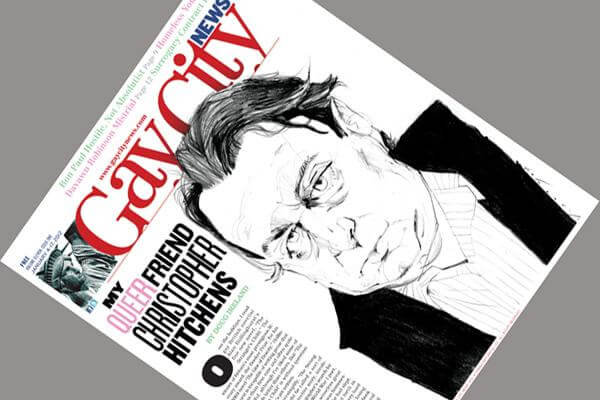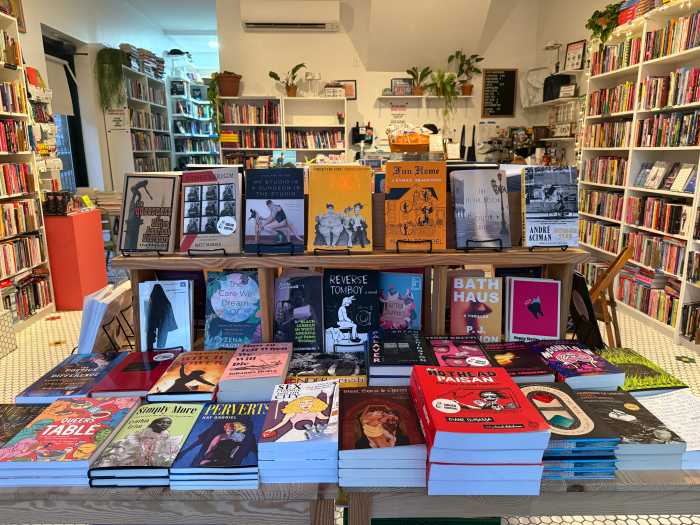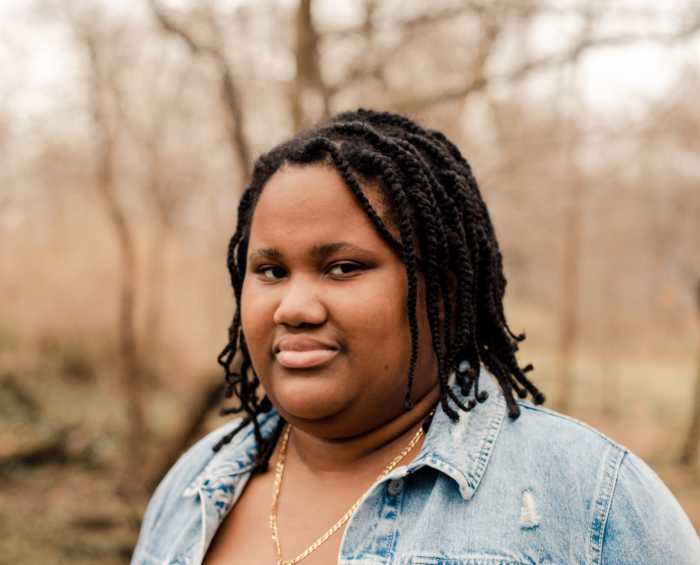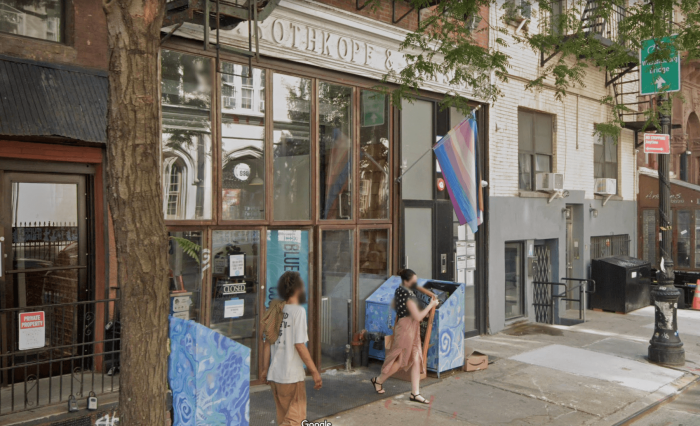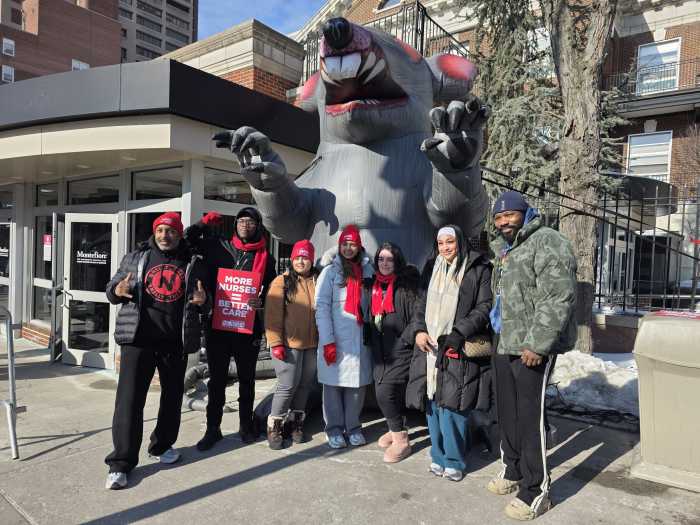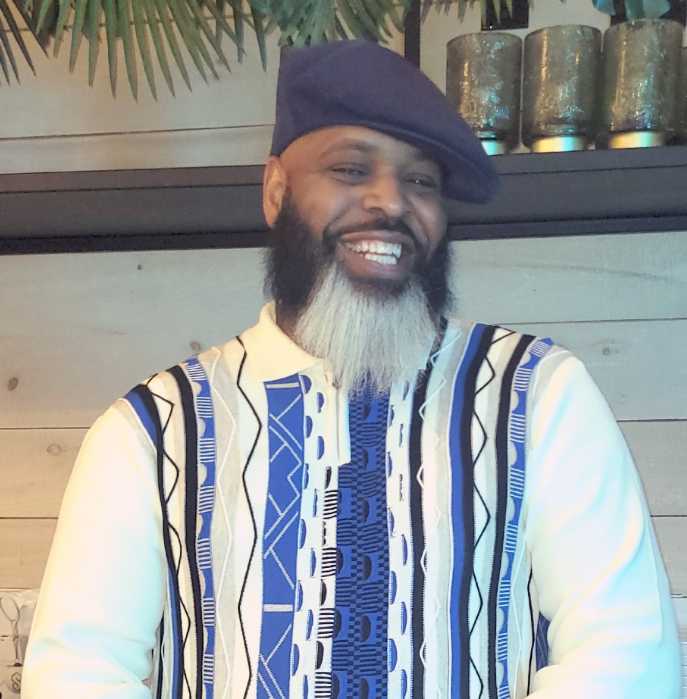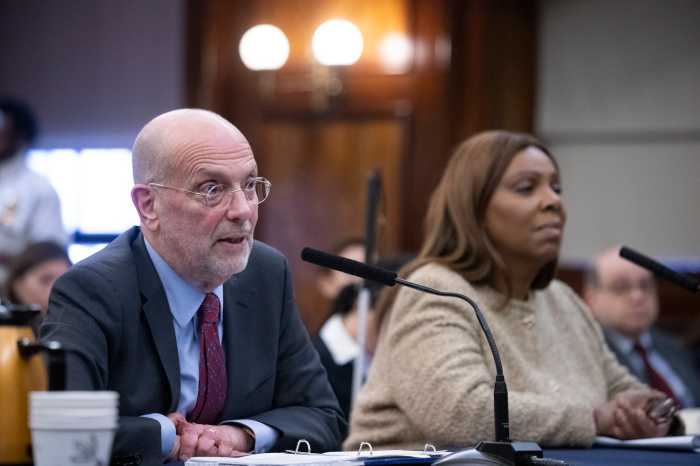In Hitch's memoir, he wrote that his “€œtranscendent”€ schoolboy affair “helped teach me as vividly as anything could have that religion was cruel and stupid.” | VINCE JOY
Over the holidays, I read gay British novelist Alan Hollinghurst’s fine new novel, “The Stranger’s Child.” The winner of Britain’s most prestigious literary award, the Booker Prize, for his 2004 novel “The Line of Beauty,” Hollinghurst is incapable of writing prose that is less than first-rate and often quite beautiful, although I’ve liked some of his novels better than others. But “The Stranger’s Child” is without question the finest he’s yet written.
To vastly oversimplify, “The Stranger’s Child” might be called a sort of queer literary detective story, involving a young gay biographer’s search for proof that an iconic World War I poet, tragically killed in the senseless great slaughter of 1914-1918, was homosexual, and with which men he had slept. The novel jumps back and forth in time over a century — this is very hard to pull off successfully without losing or confusing the reader, and the book must also be considered a structural masterpiece as well as a fascinating read and a literary achievement.
In one section of the book, set in the early 1960s, there is a reference in chat at a dinner party to “Leo Abse’s bill” then pending in Parliament, without further explication. I would guess that there are no more than a handful of Americans who will know that Leo Abse, a real-life backbench left-wing Labour Party member of Parliament from Wales for three decades who died in 2008 at 91, deserves a very special place in the pantheon of heroes in the long struggle for gay human rights.
Doubting that even many British readers, even the gay ones, would get Hollinghurst’s reference to “Leo Abse’s bill,” I asked one of the brighter stars in the UK’s journalistic firmament today, Johann Hari, the openly gay columnist for the Independent, a fine upmarket daily, for his opinion.
“You’re sadly right about Leo Abse, he’s virtually totally forgotten,” Hari told me, “and his books are out of print, alas. I doubt one in 1,000 gays here would know who he was.”
I confess that, when I read Hollinghurst’s obscure reference to “Leo Abse’s bill,” tears began rolling down my cheeks. But I was not weeping for the admirable old Abse — a heterosexual who wrote several books sympathetic to homosexuality after leaving Parliament — but for my very dear friend Christopher Hitchens, who had died just days before on December 15 after an excruciating, doomed battle against a galloping esophogeal cancer.
It was, after all, thanks to Hitch — as all of us who loved him called him; he detested being called “Chris” — that I knew who Leo Abse was and about his extraordinary contribution to homosexual emancipation.
In fact, over the decades of our friendship, I had learned more homosexual British lore from Hitch than from anyone else I’ve ever known. He also had the best gay gossip. It was he who told me how Lord Mountbatten, the commander of Allied forces in Southeast Asia uring World War II and the great uncle of Charles, Britain's crown prince, was known in the navy as “Lord Mountbottom” for his particular interest in young seamen. (Hitch's father had been a career naval officer whom he always referred to as “The Commander.”)
I remember the occasion on which he told me about Abse with perfect clarity. I had decided to write an article for Gay City News about the 50th anniversary of the Wolfenden Report, which in 1957 had recommended that homosexuality be legalized. (See my September 6, 2007 “Free the Buggers: Britain and the Wolfenden Report.” ) The history-making report was named for a commission chaired by Lord John Wolfenden, a well-known educator who had been headmaster of several of those elite British private schools which, in a class-rigid society, were the sine qua non for admission to a first-rate university and the gateways to a successful career.
But those all-male private schools of the type Wolfenden headed were also hothouses of “beatings, bullying, and buggery,” as Christopher put it in his critically acclaimed memoir “Hitch 22,” a best-seller published in early 2011, and filled with material that will interest readers of this newspaper. Hitch’s description of the often sado-masochistic relations among students and their many closeted teachers, who inculcated their charges with the work of queers like Plato, Wilfred Owen, and W.H. Auden, has seldom been so stylishly and economically evoked as in the “Hitch 22” chapter entitled “Fragments of an Education.”
The sexual hypocrisy which reigned in these schools Hitch summarizes by quoting a satirical verse by that grand old bugger Lytton Strachey, one of the most talented writers in the world-famous Bloomsbury Group:
How odd the fate of pretty boys!
Who, if they dare to taste the joys
That so enchanted Classic minds,
Get whipped upon their neat behinds.
Yet should they fail to construe well
The lines that of those raptures tell
It’s very odd, you must confess —
Their neat behinds get whipped no less.
But I digress. When writing about the Wolfenden Report, it was only natural for me to ring up Hitch, who in 1967, when “Leo Abse’s bill” was finally passed, was a militantly left-wing, bisexual student at Oxford well-known for his entertaining oratory on every cause there was — from the struggle against the war in Vietnam to support for striking miners to the agitation for the Abse fill.
I left a message on Hitch’s machine, and he rang me back late in the evening. And for some two hours, with the tinkling music of the ice in his ever-present glass of Scotch gently audible in the background, he recounted to me in marvelous detail the ins and outs of the long-delayed passage of “Leo Abse’s bill,” which at long last repealed the infamous Labouchere Amendment, the insane law under which Oscar Wilde had been imprisoned some 72 years before.
Hitch told me, after a lengthy tribute to Abse, that “the man who doesn’t get as much credit as he deserves for it was Wilson’s home secretary, Roy Jenkins, a very right-wing social democrat. Jenkins, who was heterosexual, didn’t care about nationalization or economic matters, but he was deeply committed to three things — end the death penalty, free the buggers, and liberalize the laws on divorce and abortion.” It was Abse who persuaded Jenkins to put the force of Harold Wilson’s Labour government support behind decriminalization.
But, Hitch added, “There was tremendous opposition from the Labour members of Parliament representing the miners. In fact, Matthew Coady, the New Statesman’s parliamentary correspondent, wrote a famous article for the weekly in which he denounced the miners’ MPs and detailed the widespread homosexual conduct in the coal mines. And, in fact, any miners’ MP who claimed he didn’t know that many of the lads down in the pits were having it off with each other was telling the most gigantic fib.”
When I first met Hitch in the late ‘70s, I was the Washington columnist for New York magazine — and though it may seem hard to believe now, in those days you could count the number of openly gay journalists writing in the mainstream press on the fingers of two hands. My militant involvement in the gay liberation movement was no secret, and in the first of many long and bibulous nights I spent bending the elbow with Hitch — who, even in my most capacious younger days of alcohol consumption, which was considerable, could still drink me under the table — he made a particular point of telling me that the most intense and important emotional relationship in his life had been when he’d fallen in love with another teenage boy at school, a confidence which, as it was meant to, created a special bond between us and opened a level of emotional trust that was never after to be shaken. Hitch told me he admired my guts in being “out” in what was still a horribly homophobic profession.
In “Hitch 22,” he describes the “transcendent” schoolboy affair as “my first exposure to love as well as to sex, and it helped teach me as vividly as anything could have that religion was cruel and stupid. ‘Created sick: commanded to be sound.’ The details aren’t important, but until this moment I doubted that I would ever be able to set them down.
“‘He’ was a sort of strawberry blond, very slightly bowlegged, with a wicked smile that seemed to promise both innocence and experience. He was in another ‘house.’ He was my age. He was quite right-wing (which I swiftly decided to forgive him) but also a ‘rebel’ in the sense of being a cavalier elitist… The marvelous boy was more urbane than I was, and much more knowing, if slightly less academic. His name was Guy, and I still sometimes twitch a little when I run into someone else who’s called that — even in America, where in a way it is every boy’s name.
“Were poems exchanged? Were there white-hot and snatched kisses? Did we sometimes pine for the holidays to end, so that (unlike everyone else) we actually yearned to be back at school? Yes, yes, and yes….
“When we were actually caught… the senior boy who made the discovery was a thick-necked sportocrat with the unimprovable name of Peter Raper: he had had his own bulging eye on my Guy for some time and this was his revenge.”
When the odious Raper reported to the school authorities that he’d caught Hitch and Guy virtually in flagrante, “The normal ‘thing’ would have been public disgrace, followed by expulsion. But ‘things’ were made both more cruel and more arbitrary, and also less so. Various of my teachers persuaded the headmaster that I was a good prospect for passing the entrance exam for Oxford: a statistic on which the school annually prided (and sold) itself. The same could be said of Guy, though he didn’t eventually make it. Accordingly, having been coldly exposed to public shame, we were allowed to ‘stay on,’ but forbidden to speak to each other. At the time, I vaguely but quite seriously thought that this might have the effect of killing me.”
For the greater part of our friendship, Hitch and I were comrades in a thousand struggles — we were both socialists, both militant atheists (Hitch’s magnificent, best-selling polemic, “God is Not Great: How Religion Poisons Everything,” is an indispensable book of good sense that should be made obligatory reading in every young person’s education). We were both deeply moved and incensed by violations of human rights and by the violence of poverty and exploitation of the powerless.
When he became a columnist for the Nation, I was at that time often writing for it, and we moved in many of the same social and political circles. Often we’d leave parties together to continue drinking and talking in private, where the most intimate confidences and difficulties were able to be shared. I went through his painful split from his first wife, Eleni, with him, and he always displayed a tender interest in the ups and downs of my love life that wasn’t faked.
So when Hitch, in the wake of 9/11, began to turn away from the left on a number of central foreign policy questions — he became a vocal supporter of the war in Iraq — it was a journey that led to his eventual support for the re-election of George W. Bush. He went so far as to permit himself to be photographed for a magazine cover with the inevitable glass of Scotch in his hand wearing a T-shirt that proclaimed, “Vote Bush!” I so loved and admired Hitch and his immense talent that his loss to the left was, for me, like the amputation of a body part.
We debated his support for Bush both in private and in print. At the time I was covering national politics for the L.A. Weekly, and he agreed to let me publish excerpts from our correspondence on this oh-so-touchy issue. (Anyone interested in reading our debate can find it at laweekly.com/2003-03-20/news/getting-bush-whacked/ ).
Many of my left-wing friends who had stopped speaking to Hitch were surprised that I continued to maintain warm and friendly relations with him. This was possible only because, after our pubic debate, we both instinctively avoided those subjects on which our differences were too profound.
But I owed Christopher a great deal, probably including my life. During the decade I lived in Paris, I found my One Great Love, whose name was Hervé Couergou. The son of working class parents who were both Catholic and Communist, and thus doubly homophobic, he’d left home when he was but 15. Although he possessed superb literary taste and harbored ambitions of writing, his class background and tumultuous youth had deprived him of the confidence to do so. In our partnership after we declared our love for one another, I was finally able to help him find some of that self-confidence, and he was just beginning to make a serious effort to write when he was diagnosed with AIDS. He did not want to die in France, from which he felt deeply alienated, and wanted to see the United States before he died. So I moved back to New York to prepare the way for him to come to live here, finding a job — first as a columnist with the New York Observer, then moving to the Village Voice, which had a non-discriminatory health insurance policy which would have covered him as my partner.
But just two months before Hervé was to move here to join me, President Bill Clinton, as part of the same strategy to win Republican votes that led him to sign the Defense of Marriage Act, saw fit to renew George Herbert Walker Bush’s executive order barring admission into this country to anyone with HIV. This meant that Hervé could not come here to live legally, and thus could not be covered by my Voice health insurance. He made several trips here on all-too-brief tourist visas, but on each visit was terrified lest the customs officials find the AZT in his luggage and send him back to Paris. On his last trip here, when the ravages of the disease began to be visible on his face, he had an actress friend cover him in makeup to hide the physical evidence.
Soon, Hervé became too ill to work, and despite France’s excellent public health coverage, second opinions — which became increasingly necessary — were not covered, nor were his rent and living expenses. I had to stay here to work and pay for all of this, and was thus denied the chance to take care of him in his illness, which in the final year of his young life — he was 20 years younger than I — were excruciating.
There have been many medical studies that demonstrated conclusively that those with AIDS who had partners to care for them lived significantly longer than those who didn’t. If I ever again were to run into Bill Clinton, I would still today spit in his face for his sadistic act of cruelty that, I’m certain, got him not a single vote, yet ruined so many lives.
Our separation was, for me, unbearable. And when Hervé died, he was alone — I could not get to Paris quickly enough to hold his head and his hand as he left. I did not show it to friends and colleagues, but I then fell into a black hole of despair and depression and was seriously considering quitting this life on my own.
Hitch knew a great deal about suicide. His own mother had killed herself, and over many years he’d read and meditated on everything significant written on the subject, as he describes in the chapter of “Hitch 22” entitled “A Coda on Self-Slaughter.”
Hitch, who was always flying to some far-flung corner of the world to report on people who were oppressed or suffering, was out of the country when Hervé died. But when, on his return, he heard about it from a friend, he immediately called me. He’d met Hervé — we’d had a marvelous dinner together one night — and knew how much he meant to me.
Hitch also knew me well enough to have sussed out, without being told, that I was seriously considering ending my own life. But he spent several hours making me understand how wrong that would be, how ashamed Hervé would have been had he known he’d caused my death. I will not recount here all that Hitch said to me then, but had it not been for that conversation I might well not be here to write these words.
Time and again, I would ask Hitch’s help for some queer cause or other — and never met with a refusal, even after his endorsement of Bush. This was particularly true when I asked him to write letters on behalf of gay refugees facing deportation.
Or there was the time when Louis-Georges Tin, the president of the Paris-based International Day Against Homophobia, wanted my help getting celebrity signatories to help launch a drive for a declaration to the United Nations that homosexuality should be decriminalized globally. Not only did Hitch instantly sign on himself, he gladly took on the task of rounding up some of his celebrated UK writer friends — and soon my e-mail inbox was full of notes from Salman Rushdie, Martin Amis, and a lovely brochette of other names who figure among the UK’s most celebrated authors, all thanks to Hitch. (For a full list of those signatories, see my November 21, 2006 “Bold Move for UN Action.”)
My requests for Hitch's help on gay causes were so numerous that he soon baptised me with a special nickname. His notes to me often commenced with the salutation “Dearest United Fruit” (an inside joke among two old left-wingers alluding to the rapacious US multinational that virtually dictated American policy toward –– not to mention the governments of –– the “banana republics” of nearly all of Latin America). I adored his pun, and began signing my notes to him, “Love from United Fruit.”
Hitch never made a secret of the fact that his bisexuality continued well into his university years. In this honesty, he was so unlike a number of the male characters in Hollinghurst’s “The Stranger’s Child,” who — having settled into conventional heterosexuality and parenthood — went to great lengths to conceal their youthful affairs with the doomed queer poet at the center of the story.
In his memoir, Hitch, in describing his sexual encounters with young men while a penniless and militantly left-wing student at Oxford, relates how he’d frequently be invited by wealthy and attractive young men, often right-wingers, to lavish dinner parties with good food and even better wine and spirits and would often accept, knowing that he would have to “sing for his supper” — a euphemism that should be understood as not merely being entertaining but as “putting out.”
Hitch wrote that “now and then, even though I was by then fixed on the pursuit of young women, a mild and mildly enjoyable relapse would occur and I suppose I can claim this… of two young men who became members of Margaret Thatcher’s government.”
This offhand mention made headlines when “Hitch 22” was published in the UK.
“So who WERE the two Tory ministers who had gay flings with Christopher Hitchens at Oxford?” screamed the headline on the Daily Mail, the right-wing tabloid that is the world’s third-largest English language newspaper. It went on to quote Oxford contemporaries of Hitch’s as saying “He had a reputation for being AC/ DC and, although a Trot, he was fancied by quite a few gay Tories and moved in those circles.”
While the Mail interviewed a number of senior Tories whom they considered possible candidates, and who acknowledged that Hitch was “sexy and charming” to men as well as women, they could get none of them to admit to any carnal knowledge of the inimitable memoirist.
In my view, Hitch was queer in several ways — both in the Merriam-Webster definitions of the word as “eccentric,” “unusual,” “unique” (he certainly was “sui generis”) and in the sense that he “got” us in a way that few non-gay writers ever have.
Just dip into Hitch’s massive essay collection, “Arguably,” published last year by Hachette Book Group’s Twelve collection. It’s a terrific reminder of the erudition and range of which Hitch was capable and of his great gifted pen.There’s a lot about homosexuals and homosexuality in many of the assembled articles — just look at his devastating readings of that old closet case Somerset Maugham, or his send-up of the ex-bugger Stephen Spender, who went to great lengths to expunge his youthful homoerotic poetry from later editions of his collected poems and rewrote other poems to remove lines betraying his attractions to boys. Hitch neatly dispatches Spender, who began as a Communist and ended up editing a CIA front magazine called Encounter as a somewhat reactionary curmudgeon, by quoting this devastating limerick:
Then up spake the bold Stephen Spender
“you may think my conscience is tender
You might think my heart
Was my sensitive part —
But you should see my poor old pudenda.”
The last line is even more cutting about Spender’s re-entry into the closet if one knows, as Hitch surely did, that the root of “pudenda,” a synonym for female genitalia, is the Latin gerunditive “to be ashamed.”
I could offer a long list of articles Hitch wrote denouncing homophobia and the sexual hypocrisy of closet cases — but to mention just one, there was his famous 1987 Harper’s essay, “It Dares Not Speak Its Name: Fear and Loathing on the Gay Right,” which — two decades before Senator Larry Craig’s “wide stance” became a favorite joke for the TV comics — created a furor when he found the locus of the Republicans’ homophobia in their fear and loathing of their own same-sex attraction.
Hitch said and wrote often that “I say that homosexuality is not just a form of sex, it’s a form of love — and it commands our respect for that reason.”
With Hitch’s death, we have all lost a friend — and a voice I never tired of hearing on the other end of the telephone line has been stilled forever. Fortunately for us all, we still have his books. But I shall miss him more than I can say.

